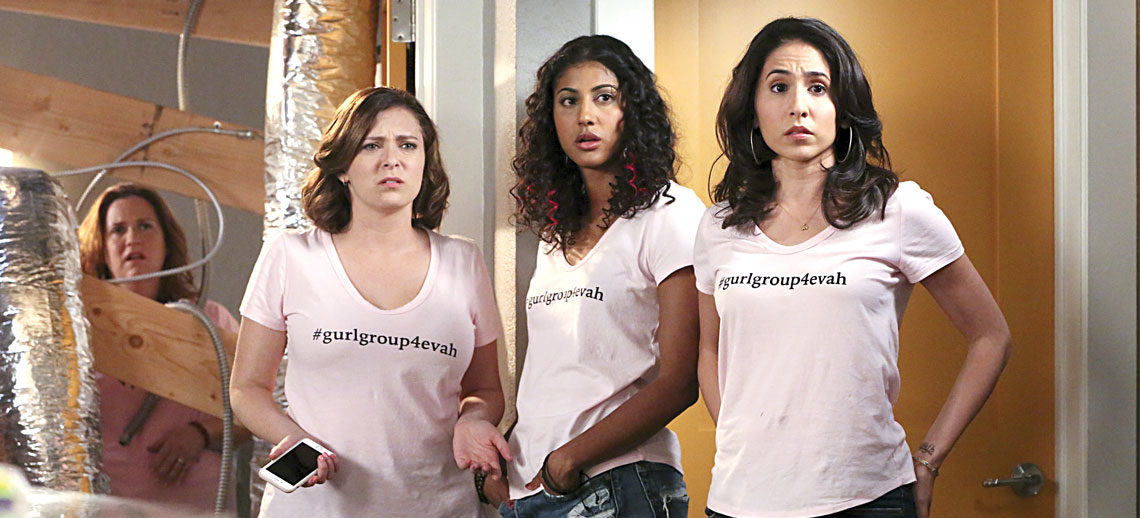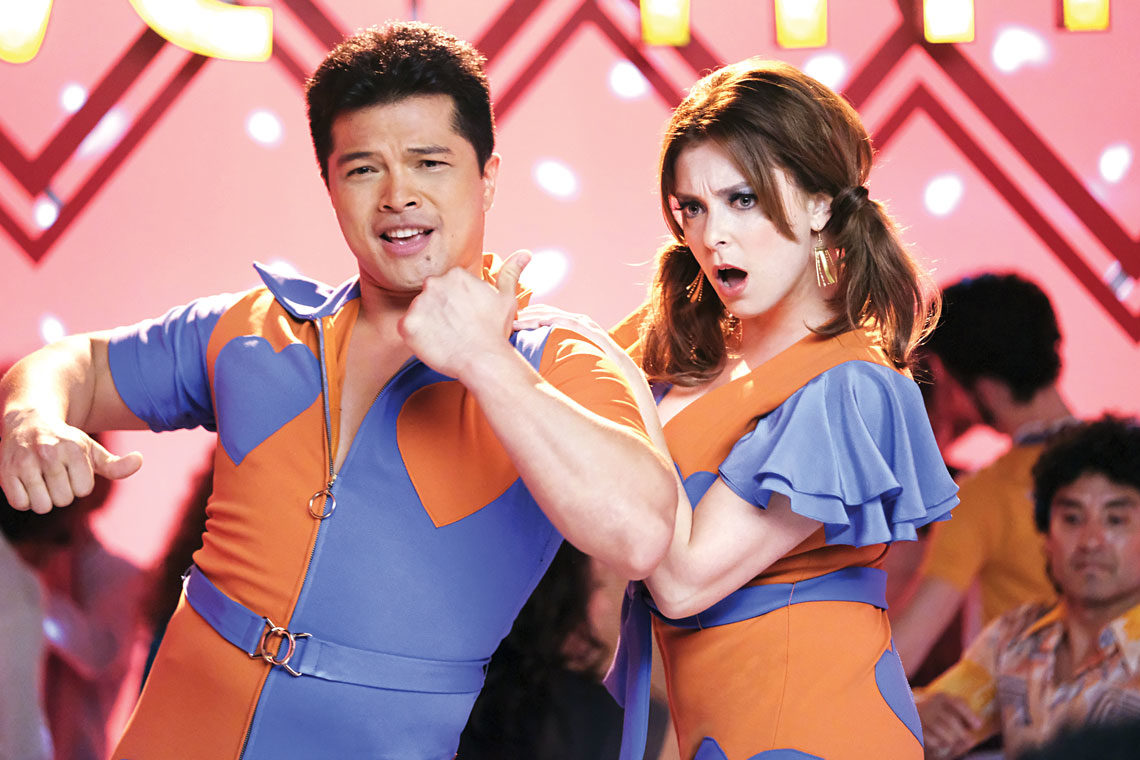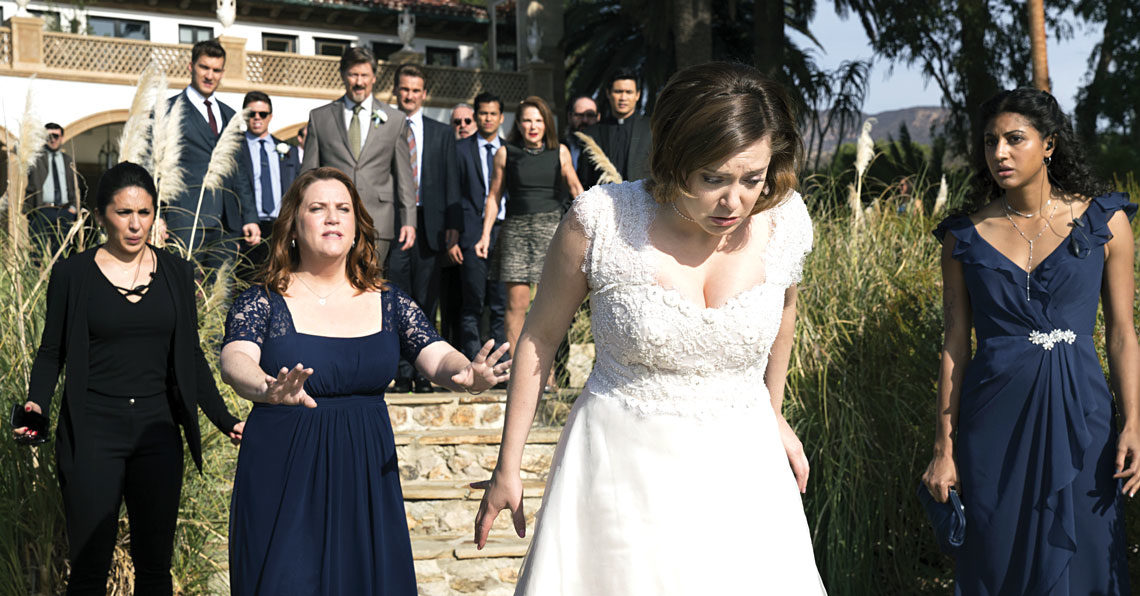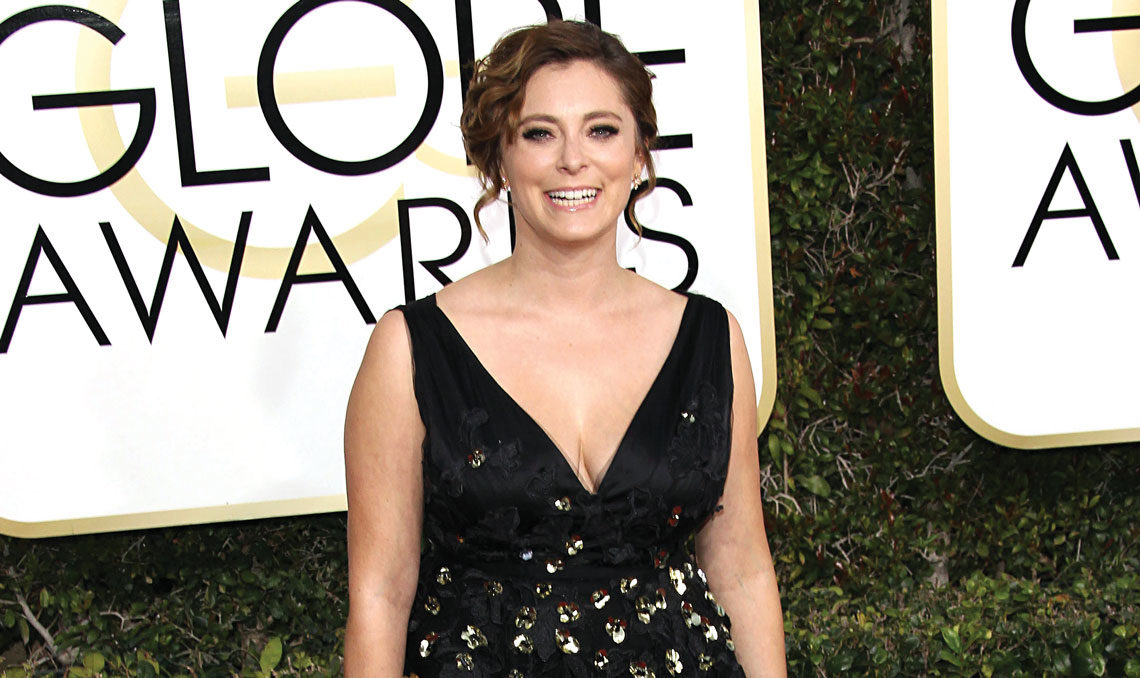 Rachel Bloom. Photo by Nino Muñoz/The CW
Rachel Bloom. Photo by Nino Muñoz/The CW When it comes to Rachel Bloom, it’s hard to know whether to start with the sex or the Jewishness. Both seem to ooze out of her, like a classic starlet of the Yiddish theater in which burlesque comedy could arrive in a voluptuous feminine package.
Consider the music video “You Can Touch My Boobies,” which has more than 5 million views. Bloom plays a Hebrew-school teacher who appears in a dream to seduce her kippah-wearing bar mitzvah student, Jeffrey Goldstein. Clad in a black bustier and fishnets, she rides around in a toy car shaped like a giant breast — with a nipple for a hood ornament — crooning, “We’re gonna have some fun tonight.” No need to check the locks, she tells Goldstein, because — wink, wink to American Jewish dining habits — his parents are out at Benihana. But Jewish guilt is never far behind, and suddenly, Golda Meir appears to scold Jeffrey for his fantasies: “You have brought shame on your family and the Jewish people!”
In the tradition of Woody Allen, Bloom has deftly translated the American-Jewish experience — its neuroses, obsessions and culturally distinctive lexicon — into mainstream entertainment. As a writer and actress, Bloom routinely probes aspects of her identity — relishing, mocking, exuding sexuality and Jewishness — both in the prolific collection of music videos she posts on YouTube, as well as on the CW show “Crazy Ex-Girlfriend,” a musical romantic comedy that she co-created and stars in.
[Watch Rachel Bloom’s Jewiest music videos]
In Rachel Bloom, we have a female heir to the neurotic, outsider Jew who is constantly negotiating identity through sex and ethnic baggage. There are strains of Philip Roth in her work — a sex-obsessed Jew feeling ever out of place, trying to grow up and fit in. And what we gather from Bloom, a millennial, is that although political frissons have somewhat altered the American-Jewish makeup, a generation later, communal preoccupations are the same.
The 29-year-old is an expert at channeling the tropes of her male artistic and literary forebears, where sex and Judaism coalesce and collide as integral, paradoxical and indispensable to the human experience. But she upends theses legacies with something new and utterly transgressive: a female point of view.
“I think a lot about Fanny Brice’s aesthetic,” Bloom told me when we met for coffee last month in Silver Lake. “Her whole thing was Yiddish, Yiddish, Yiddish. I did 23andme [the genetic test] and I’m 97 percent Ashkenazi Jewish. Yiddish is what I connect to.”
The comparison to Brice (the comedian-actress immortalized in the movie “Funny Girl”) is apt — except for the fact that Bloom, unlike Brice, writes all of her own material. In just two seasons of “Crazy Ex-Girlfriend,” Bloom has written or co-written more than 80 original songs. “That’s more than four Broadway shows,” she said.

“Crazy Ex-Girlfriend” tells the story of Rebecca Bunch, a tenacious, Harvard-educated Manhattan lawyer. After a chance encounter on a New York sidewalk with a guy she dated at summer camp, she becomes unmoored, determined to pursue her crush all the way to the West Coast. She walks out of her high-paid, partner-track job and follows the object of her affection to his hometown — West Covina. Last year, the role earned Bloom a Golden Globe award.
The day we met, Bloom had just wrapped the show’s second season, which is now available in its entirety on Netflix. She declared a recent episode “the most Jewish episode we’ve ever done.” In Season Two, Rebecca finally ensnares her lifelong obsession, the under-employed, none-too-bright Asian-American Josh Chan (Vincent Rodriguez III), and makes him her boyfriend. Before long, they’re heading together to Scarsdale for a bar mitzvah, and Rebecca frets nervously over how her family and friends will receive them. “Will Scarsdale Like Josh’s Shayna Punim?” asks the episode’s title.
What Rebecca does not expect is that her overbearing mother (played expertly, as always, by Tovah Feldshuh) warms quickly to Josh, learning to call him a “Pacific Islander” instead of “Oriental,” and teaching him how to make and pronounce challah. But rather than quell Rebecca’s anxiety, her mother’s acceptance intensifies it, as if to say: If a Jewish mother approves, something is definitely wrong. Rebecca’s anxiety then shifts from Josh’s outsider status to her own: At the bar mitzvah, it isn’t the non-Jewish Josh on trial, but Jewish tradition itself.
Far-fetched? More like autobiographical. Bloom herself never really felt she belonged.
“I’m a West Coast Jew, so there’s always this feeling of, like, ‘What are my roots?’” Bloom said of growing up an only child in Manhattan Beach. Religious observance was anathema at home, but, Bloom said, “We talked about being Jewish a lot, we talked about Christian oppression a lot, and for as long as I can remember, my father’s been telling me to read ‘The Protestant Ethic and the Spirit of Capitalism.’
“[My] family felt like East Coast Jews: I was not allowed to swim in the ocean because my mother was afraid I’d drown. My parents were wary of me being in the sun because of skin cancer. I loved musical theater, Stephen Sondheim, Woody Allen. Plus I had obsessive-compulsive disorder,” she said. “All of these things combined made me feel like an outsider living in a beach community where everyone is surfing and bleach-blond. They don’t even have a word for anxiety.”
During the episode in Scarsdale, which aired in January, Rebecca is on edge the entire time. At the bar mitzvah party, she is constantly rolling her eyes and whining about how “miserable and terrible” Jews are. When her childhood rabbi, played by Patti LuPone, asks if she’s found a synagogue in California, Rebecca replies that she doesn’t believe in God, so it’s not on her to-do list. “Always questioning,” the rabbi replies gleefully. “That is the true spirit of the Jewish people!”
Rebecca is most disheartened that the boy she brought to shield her from Jewish communal rituals is actually quite enjoying himself. She can’t understand why Jewish psychological mishegoss is not blatantly apparent to him.
“You don’t understand,” Rebecca tells Josh. “You are — forgive me — a non-Jew from the West Coast. Let me explain how it goes. East Coast: dark, sad. West Coast: light, happy. These people don’t understand what fun is. Trust me.”

That’s when the horah begins — “a fun dance!” Josh exclaims — but while the traditional klezmer music plays and everyone happily clasps hands, Rebecca’s view that tragedy is never too far from the Jewish psyche is proven when the rabbi sings: “Now it’s time to celebrate / Grab a drink and fix a plate / But before you feel too great / Remember that we suffered.” The song, appropriately titled “Remember That We Suffered,” is not only the defining Jewish number of the series so far, but perhaps the most Jewishly astute musical number since “Fiddler on the Roof.”
Ironically, Bloom said it is the absence of personal Jewish suffering that has enabled Jewish exploration in her work.
“People who came over here from Europe watched their families being murdered because of Judaism,” she said. “They were terrified for their lives because of Judaism. And they came to an America that was still quite anti-Semitic, so of course they wanted to assimilate. I’ve never really suffered anti-Semitism. Sure, sometimes people call me a kike online or whatever — because people say horrible things on the internet to everyone. [But] I have never been afraid for my life because of my heritage. And that gives me the freedom to talk about it.”
Like most American Jews, Bloom fits firmly into an assimilated framework, describing her Judaism in mostly cultural, secular terms. Being Jewish is “Mel Brooks!” she said. “The feeling of being an outsider, the being cold in restaurants, the guilt, the anxiety.” She said her husband, Dan Gregor, grew up “Conservadox” on Long Island and attended yeshiva until eighth grade, but ultimately left the religious life. As a couple, they celebrate with occasional holiday meals, but a question about shul attendance got a deep, resounding “Noooo.” Not even on the High Holy Days?
“I love thinking about the fact that it’s the High Holidays,” Bloom said. “But at end of the day, he and I are both secular people. I do not believe the Torah is the word of God — I believe it’s very interesting, and that it informs my entire heritage, and there are things to be learned from it, but I do not believe the universe cares if I have a cheeseburger.”
Bloom earned her musical theater bonafides at NYU’s Tisch School of the Arts, where she led the school’s sketch comedy group, Hammerkatz. A year after graduating in 2009, she made a splash with the self-produced music video, “F— Me, Ray Bradbury,” about a young woman who fantasizes about the science fiction author and masturbates while reading his stories. Bloom’s character alternates between sex kitten — dressed like Britney Spears in “ … Baby One More Time” — and sci-fi geek, turning down a date to stay home and read.
“When I started doing musical comedy, I realized that a lot of pop music, even though I love it, does not represent how people actually are,” Bloom said. “Bradbury” was her attempt to “reconcile what I thought I should be like with what I actually was like. And I found more people [related] to the latter. More people feel like outcasts, and feel like they don’t fit in. All of us feel some form of imposter syndrome.”
After “Bradbury” went viral, Bloom continued to release a string of music videos, as well as the album “Suck It, Christmas,” a collection of Chanukah songs co-written and produced with her husband and her writing partner, Jack Dolgen. In “Chanukah Honey,” a parody to the tune of “Santa Baby,” Bloom again plays come-hither sex kitten to a Jewish love interest who “got an MBA from Penn — Amen” but, unfortunately for her, dates Japanese women. Replete with references to the JCC, bat mitzvahs and camp, Bloom tempts her crush to “Come and flip my latkes tonight” as she rolls around on the floor in a blue-and-white Santa outfit. Of course, with Bloom, being a good Jewish girl, sex isn’t all she’s after: “But seriously,” she asks as an aside, “do you want kids?”

On her first trip to Israel last year, Bloom said, she played her Israeli tour guide some tracks from the Chanukah album, thinking he’d get a kick out of it. “We wrote a song about cantors, but no one in Israel talks about cantors,” she observed. Bloom was surprised to discover that even though she “loved” visiting Israel, she didn’t really relate to it. “It was really crazy to be in a country for all Jews, but Israel is not my culture,” she said.
Because she is an Ashkenazi Jew, European persecution is much more her thing, and it pops up in the animated video “Historically Accurate Disney Princess Song,” a feminist send-up of Disney fairy tales. While searching for her prince, Bloom encounters little Jews hiding out in the forest. “I never did ask you, why do you hide in the forest? Oh, I see, to hide from people trying to kill you!”
The video caught the attention of screenwriter Aline Brosh McKenna, who penned “The Devil Wears Prada” and “27 Dresses.” She arranged to meet Bloom; together, they solidified the idea for “Crazy Ex-Girlfriend” and promptly sold the pilot. Bloom had her big break into Hollywood.
What followed was a crippling period of anxiety and depression. “Mental illness runs rampant in my family,” Bloom said, “and no one has ever dealt with it.” The actress speaks openly and publicly about her struggle with anxiety — and not the kind treated as a kitschy Jewish trait, but a debilitating affliction. To tame her illness, she does cognitive behavioral therapy and practices meditation. She also sees a psychiatrist.
“I think keeping things taboo, keeping things secret, for me, that’s when things get bad,” she said. “When you learn to deal with anxiety, you think about what you actually know to be true versus what you tell yourself. These catastrophic thoughts, do you actually think those things are going to happen?”
The angst dates back to middle school, where Bloom said she was bullied. “I never felt pretty,” she said. “I wanted to be pretty, but I felt disgusting. And people told me, ‘You’re ugly; you’re a loser.’ It was the way I dressed, I cut my own hair. Then in eighth grade, I started to get boobs and I got more positive attention. And that only continued to grow. So I feel like I have a perspective on being a sexual being, as someone who hasn’t always been that. I appreciate it, but I also see the absurdity of it: Suddenly I have value because sacks of fat on my chest grew?”
Bloom’s interest in the way sex shapes identity is a constant theme in her work, a trait she shares with male Jewish predecessors like Woody Allen and Philip Roth. But her approach to sex constitutes a radical departure from the conventions of Jewish sexuality that have been canonized in film and literature — mainly by men. Whereas Jewish men typically have dealt with feelings of extreme sexual alienation, Bloom offers the bliss of sexual possibility. Where her male counterparts were ensorcelled by sex, Bloom is determined to demystify it.
At the end of the “Bradbury” video, instead of allowing a reference to Bradbury’s book “Something Wicked This Way Comes” to serve as pun, Bloom trades the erotic for the mechanic: “And by come, I mean ejaculate,” she declares, as if giving a science lesson.
Sex gets the same biological treatment on her show, which has featured numerous musical numbers that deal with the more visceral, uncomfortable truths about sex. “The Sexy Getting Ready Song” is about the difficult, unpalatable things women do to groom themselves for a date — and includes a bloody scene of anal waxing. In the sardonic hip-hop number “Heavy Boobs,” Bloom salutes and ridicules her ample bosom by dressing as a scientist holding up plastic bags filled with breast fat. The song “Period Sex” needs no explanation.
“The reason I’m so open and honest and brassy and ballsy about this s— is because my goal, if there’s a goal that I have as an artist, would be to make us all realize we are all just animals on this earth made of guts, who are all just trying to survive and get along,” she said.
If the defining feature of Jewish sexuality until now was sexual inadequacy, Bloom has rewritten the script. A child of the post-feminist generation, she is fully awake to her sexual power. But rather than use it strictly to seduce, she subverts the male gaze by drawing attention to the body’s anatomical indignities. It’s as if she’s trying to warn young Jeffrey Goldstein that his sexual fantasy will likely end with a urinary tract infection.
“There might be a tiny part of me that’s still a little afraid of being sincerely sexy because then you risk looking foolish,” Bloom said. “It’s much easier for me to be brassy-funny-sexy because there’s a protectiveness to that, and I don’t want to feel taken advantage of. It’s all about control.”

With lipstick and a dress, Bloom can easily play the bombshell. But off-screen she’s content in a gray T-shirt and bomber jacket. When we meet, she isn’t wearing an ounce of makeup, another way she peels back the curtain on the many façades of being female.
“When I learned sketch comedy, I felt like I suddenly had to become a dude, because that’s the culture of comedy,” she said, lowering her voice to sound like man. “Dude, bro, f—.’ There is a certain adopting of a façade when you are anything other than the majority, and I think that gives you an understanding of others who are oppressed.”
If feminism bequeathed to her a creative benefit, Bloom said, it is “the freedom to say what I want.”
Her fearlessness certainly resonates with her Jewish audience, which goes bananas every time Bloom explodes an old stereotype. After she took on the meaning of Jewish American Princess in the “JAP Battle” rap, a female writer for the Jewish online magazine Tablet ecstatically declared, “I am FINALLY THE DEMO OF A THING. I have never been the demo of a thing!”
But ultimately, a Jewish audience may not be enough to sustain even a critically acclaimed show.
“I’m not afraid to make my show Jewish,” Bloom said, “but at the same time, my show is the lowest-rated show on network television. So while specificity is important to good art, I don’t know how much of a mass appeal there is in openly talking about Judaism.”
In the past, Jewish artists like Allen and Roth could be rueful about their Jewishness, perhaps a little bit ashamed. But not Bloom. Instead, she seems to revel in it. And she’s not prepared to stop anytime soon. At the end of our meeting, Bloom was rushing off to start work on Season Three. It’s not just a job for her, but a community, a purpose, a spiritual salve.
“For most of my life, I’ve kind of felt like I don’t really have a place, and the success of this show not only draws me to people who have also felt like that, but it makes me feel I have a place to fit in. It’s cathartic to realize I’m not alone.”






















 More news and opinions than at a Shabbat dinner, right in your inbox.
More news and opinions than at a Shabbat dinner, right in your inbox.